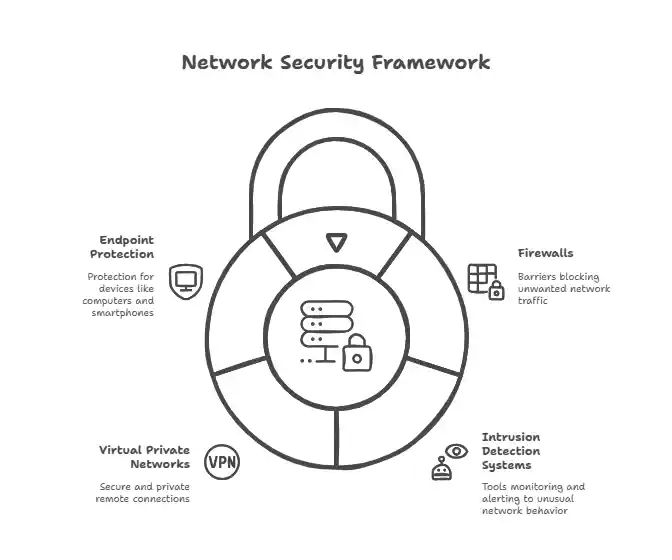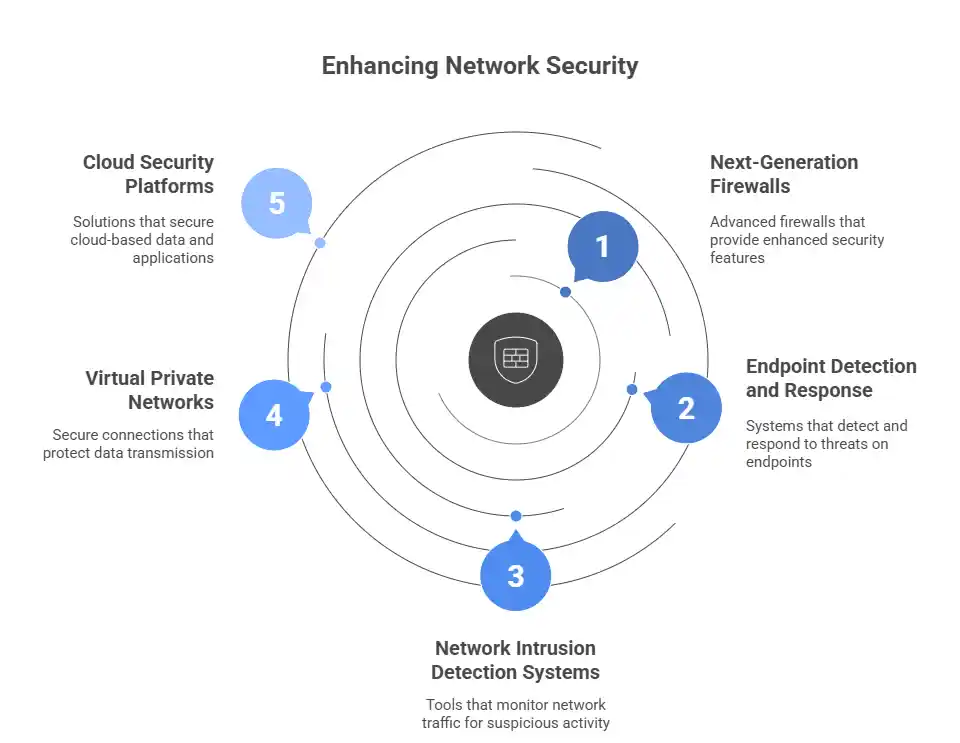Table of Contents
Introduction
In 2025, cybercrime is expected to cost the world $10.5 trillion.
The average cost of a data breach has reached $4.88 million a 10% rise. As more industries go through digital transformation, the risk of cyberattacks also grows. This makes strong network security solutions more important than ever.
Today’s businesses face many dangers. These include advanced ransomware attacks and persistent threats that can stay hidden for months.
But network security is not just about protecting data. It also helps businesses follow laws and rules, keep customer trust, and avoid costly disruptions.
In this article, we will explain the top network security solutions that every business should consider. You will learn how each solution works, what benefits it brings, and how to pick the right mix of tools to keep your business safe. We will also share tips from industry experts and real-world cases.
What Are Network Security Solutions?
Network security solutions are tools and strategies that help protect your company’s network from hackers, data leaks, and other online threats.
They work by creating several layers of protection. These layers watch your network, spot unusual activity, and block threats before they can cause serious problems for your business.
Some of the main tools used in network security are:
- Firewalls: These act like barriers that block unwanted traffic.
- Intrusion Detection Systems (IDS): These tools watch your network and alert you to strange behavior.
- Virtual Private Networks (VPNs): These keep remote connections safe and private.
- Endpoint Protection: This protects devices like computers and smartphones from attacks.

Why Do Modern Businesses Need Network Security Solutions?
Cyberattacks are happening faster than ever. In fact, ransomware strikes every 11 seconds around the world. Most successful attacks about 85% to 95% start with simple tricks like phishing emails.
In 2024, 78% of financial companies said they faced ransomware attacks. On average, each attack cost them $5.9 million. Small businesses were hit hard too. Over half of all ransomware cases affected companies with 1 to 50 employees.
Hackers are now using AI and machine learning to launch smarter attacks. These advanced tools help them trick people more easily and sneak past old security systems.
But cyberattacks don’t just cause money problems.
According to IBM’s 2024 Cost of Data Breach Report, companies that use AI-powered security save around $2.2 million each year compared to those that don’t.
Ignoring network security can also lead to:
- Big fines under laws like GDPR, HIPAA, and PCI DSS
- Loss of customer trust
- Damage to your company’s reputation
- Loss of business and lower market value
What Are the Top 5 Network Security Solutions for Businesses?

1. Next-Generation Firewalls (NGFWs)
What it does:
- Acts as the primary defense barrier between your network and external threats
- Performs deep packet inspection and application-level filtering
- Provides intrusion prevention capabilities
Key Benefits:
- Blocks 99.7% of attempted intrusions (based on financial services case study)
- Maintains network performance for legitimate business operations
- Offers real-time threat detection and response
Best for: All business sizes seeking comprehensive perimeter protection
2. Endpoint Detection and Response (EDR)
What it does:
- Secures individual devices (laptops, desktops, mobile devices, IoT equipment)
- Provides real-time monitoring and threat detection
- Offers automated response capabilities
Key Benefits:
- Identifies and isolates threats before they spread
- Protects remote workers and distributed teams
- Reduces mean time to detection (MTTD) significantly
Best for: Organizations with remote workforce or multiple device types
3. Network Intrusion Detection Systems (NIDS)
What it does:
- Continuously monitors network traffic patterns
- Uses behavioral analysis and signature-based detection
- Alerts security teams about unusual network behavior
Key Benefits:
- Detects advanced persistent threats (APTs)
- Provides forensic investigation capabilities
- Enables rapid containment of security incidents
Best for: Medium to large businesses with complex network infrastructure
4. Virtual Private Networks (VPNs)
What it does:
- Creates secure, encrypted tunnels for remote access
- Protects data transmission between locations
- Enables secure site-to-site connections
Key Benefits:
- Reduces security incidents by up to 85% for remote workers
- Ensures data privacy over public networks
- Supports compliance with data protection regulations
Best for: Organizations with remote employees or multiple office locations
5. Cloud Security Platforms
What it does:
- Protects data, applications, and infrastructure in cloud environments
- Provides identity and access management
- Offers data encryption and compliance monitoring
Key Benefits:
- Prevents unauthorized access to cloud-stored data
- Maintains compliance across multiple cloud providers
- Scales with business growth and cloud adoption
Best for: Businesses using cloud services or planning digital transformation
How to Choose the Right Network Security Solution for Your Business
Step 1: Assess Your Business Needs
- Business Size: Small businesses (1-50 employees) vs. enterprises (500+ employees)
- Industry Requirements: Healthcare, finance, retail each have specific compliance needs
- Data Sensitivity: Classify data as public, internal, confidential, or restricted
- Current Infrastructure: Inventory existing systems and security tools
Step 2: Evaluate Scalability Requirements
- Growth Planning: Choose solutions that can expand with your business
- User Capacity: Ensure systems can handle increasing employee counts
- Feature Upgrades: Look for platforms with modular add-on capabilities
- Performance Impact: Solutions should maintain speed as you scale
Step 3: Determine Your Budget
- Initial Costs: Licensing fees, hardware, and implementation expenses
- Ongoing Expenses: Monthly subscriptions, maintenance, and support costs
- ROI Considerations: Calculate potential savings from prevented breaches
- Cost-Effective Options: Consider managed security services for smaller budgets
Step 4: Check Integration Capabilities
- Existing Systems: Ensure compatibility with current IT infrastructure
- SIEM Integration: Connect with security information and event management tools
- API Availability: Look for solutions with robust integration options
- Single Sign-On: Streamline user access across security platforms
Step 5: Research Vendor Reputation
- Customer Reviews: Check testimonials and case studies
- Industry Certifications: Look for SOC 2, ISO 27001, and other security standards
- Track Record: Evaluate the vendor’s history in handling security incidents
- Support Quality: Assess the availability of technical support and response times
Benefits of Implementing Network Security Solutions

1. Enhanced Data Protection
- Multi-layer Defense: Creates multiple barriers against cyber threats
- Real-time Monitoring: Continuous surveillance of network activities
- Threat Prevention: Blocks attacks before they reach critical systems
- Data Encryption: Protects sensitive information in transit and at rest
2. Significant Cost Savings
- Automated Security: Organizations save $2.22 million annually with security AI
- Reduced Downtime: Minimizes business disruption during security incidents
- Lower Recovery Costs: Faster incident response reduces financial impact
- Insurance Benefits: Many providers offer discounts for robust security measures
3. Regulatory Compliance
- Automated Reporting: Generates compliance reports for audits
- Audit Trails: Maintains detailed logs of security events
- Industry Standards: Helps meet GDPR, HIPAA, PCI DSS requirements
- Penalty Avoidance: Reduces risk of regulatory fines and sanctions
4. Improved Customer Trust
- Data Security Assurance: Demonstrates commitment to protecting customer information
- Reputation Protection: Prevents brand damage from security breaches
- Competitive Advantage: Strong security becomes a market differentiator
- Client Retention: Customers prefer businesses with proven security measures
5. Business Continuity
- Minimal Disruption: Maintains operations during security incidents
- Quick Recovery: Faster restoration of services after attacks
- Productivity Maintenance: Employees can work without security concerns
- Revenue Protection: Prevents income loss from cyber incidents
Common Myths About Network Security Solutions
Myth 1: “Only Large Businesses Need Advanced Security”
Reality Check:
- Small businesses are prime targets for cybercriminals
- 55.8% of ransomware incidents affect companies with 1-50 employees
- Limited security resources make small businesses vulnerable
- Cybercriminals view small businesses as “easy targets”
Why This Matters: Small businesses often lack dedicated IT security teams, making them attractive targets for automated attacks and opportunistic criminals.
Myth 2: “One Security Solution Fits All Business Needs”
Reality Check:
- Healthcare breaches cost $9.77 million on average
- Financial services face $6.08 million in average breach costs
- Different industries have unique compliance requirements
- Threat landscapes vary significantly across sectors
Why This Matters: A manufacturing company’s security needs differ drastically from a healthcare provider’s requirements, demanding tailored approaches.
Myth 3: “Security Solutions Slow Down Network Performance”
Reality Check:
- Modern solutions use AI and machine learning for efficient processing
- Next-generation firewalls maintain performance while providing protection
- Cloud-based security offloads processing from local networks
- Proper implementation actually improves network visibility and optimization
Why This Matters: Today’s security solutions are designed to enhance rather than hinder business operations, providing protection without sacrificing productivity.
FAQ
Are VPNs still necessary with modern cloud-based work environments?
Yes, VPNs remain crucial for remote work security. They create encrypted tunnels for secure data transmission, reduce security incidents by up to 85% for remote workers, ensure data privacy over public networks, and support compliance with data protection regulations making them essential for organizations with remote employees or multiple office locations.
How do security solutions help with regulatory compliance?
Network security solutions provide automated reporting for audits, maintain detailed audit trails of security events, help meet industry standards like GDPR, HIPAA, and PCI DSS, and reduce the risk of regulatory fines and sanctions through proper data protection and monitoring.
How much does cybercrime cost businesses annually?
Cybercrime is expected to cost the world $10.5 trillion in 2025, with the average data breach costing $4.88 million a 10% increase from the previous year. For specific industries, financial services face average ransomware costs of $5.9 million per attack, while healthcare breaches cost an average of $9.77 million.
Will implementing security solutions slow down my network performance?
Modern network security solutions, particularly Next-Generation Firewalls, are designed to maintain network performance while providing protection. They use advanced processing capabilities and can actually improve network visibility and optimization when properly implemented.